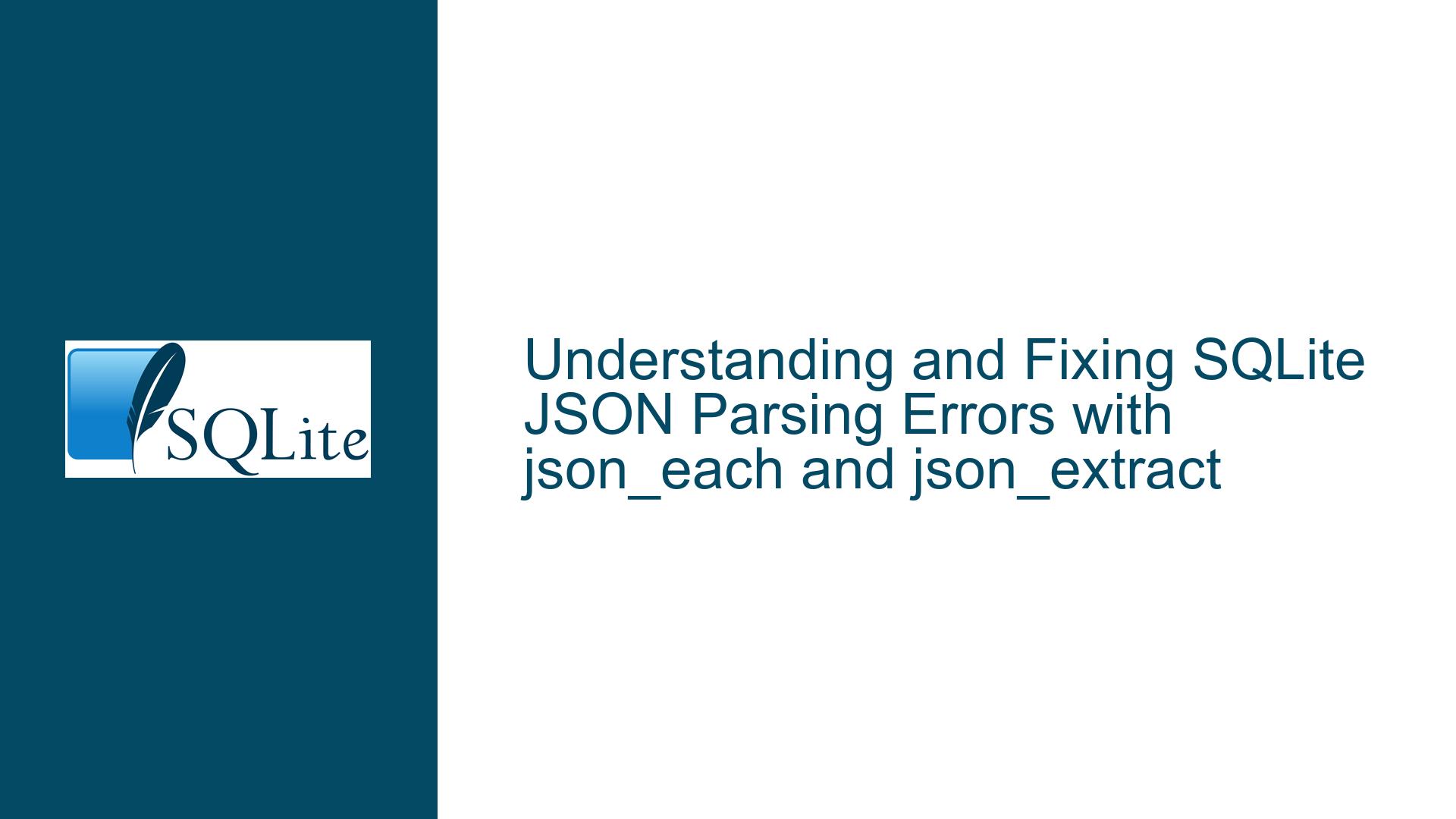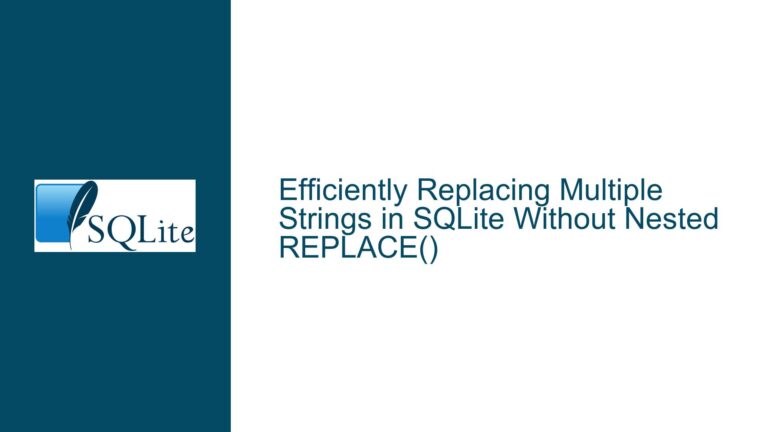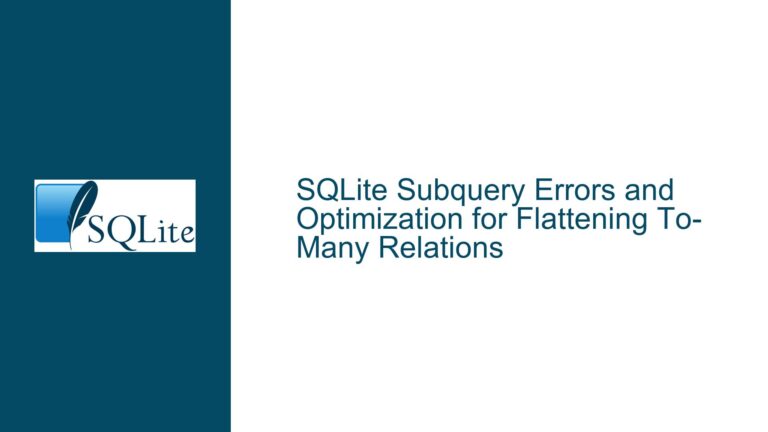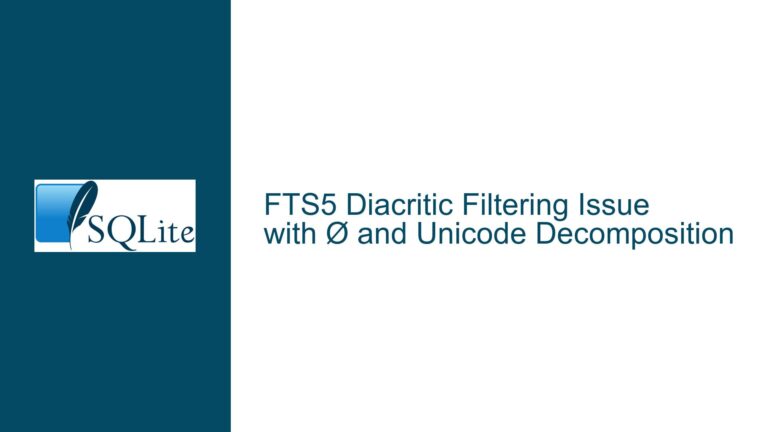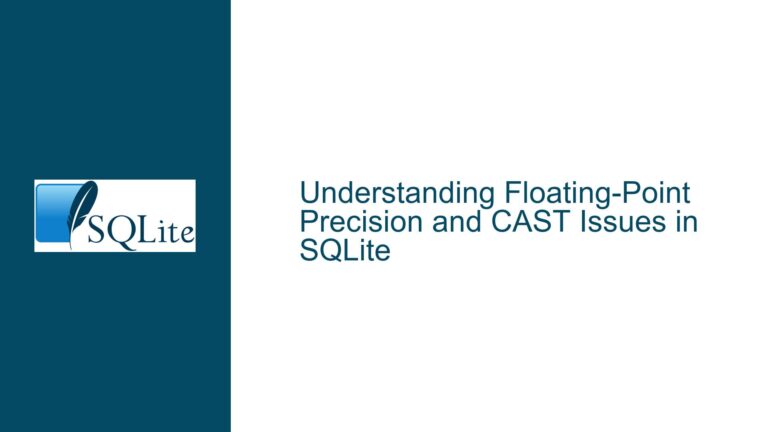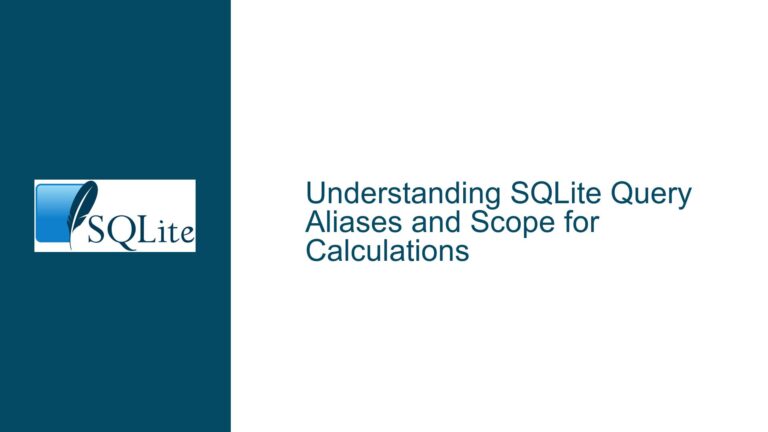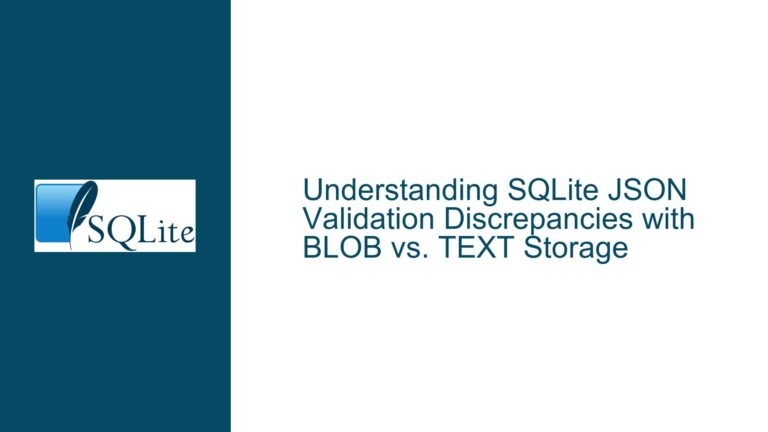and Fixing SQLite JSON Parsing Errors with json_each and json_extract
Issue Overview: Malformed JSON Error in SQLite When Using json_each and json_extract
The core issue revolves around a runtime error in SQLite when attempting to parse and extract data from a JSON object using the json_each and json_extract functions. The error message "malformed JSON" is misleading because the JSON fragment provided is valid. The problem arises from a misunderstanding of how json_each and json_extract interact with JSON data structures, particularly when dealing with JSON objects versus JSON arrays.
The user’s initial query attempts to extract a value from a JSON object using json_extract on the result of json_each. However, json_each is designed to work with JSON arrays, not JSON objects. When json_each is applied to a JSON object, it does not behave as expected, leading to the "malformed JSON" error. This confusion is compounded by the fact that the error message does not clearly indicate that the issue is related to the type of JSON structure being processed.
Possible Causes: Misuse of json_each and json_extract with JSON Objects
The primary cause of the issue is the misuse of the json_each function with a JSON object instead of a JSON array. The json_each function is intended to iterate over the elements of a JSON array, not a JSON object. When json_each is applied to a JSON object, it attempts to parse the object as if it were an array, which leads to the "malformed JSON" error.
Another contributing factor is the misunderstanding of the json_extract function’s role in this context. The json_extract function is used to extract values from a JSON structure, but it expects the input to be a valid JSON object or array. When json_each is used incorrectly, the output is not a valid JSON structure, causing json_extract to fail.
Additionally, the error message "malformed JSON" is not particularly helpful in diagnosing the issue. It does not indicate that the problem is related to the type of JSON structure being processed, leading to confusion and frustration for the user.
Troubleshooting Steps, Solutions & Fixes: Correct Usage of json_each and json_extract
To resolve the issue, it is essential to understand the correct usage of json_each and json_extract in SQLite. The json_each function is designed to work with JSON arrays, while json_extract is used to extract values from JSON objects or arrays. Here are the steps to correctly use these functions:
Ensure the JSON Structure is Correct: Before using
json_each, verify that the JSON structure is an array if you intend to iterate over its elements. If the JSON structure is an object, you should usejson_extractdirectly withoutjson_each.Use json_each with JSON Arrays: When working with JSON arrays, use
json_eachto iterate over the elements. For example:SELECT json_extract(j.value, '$.field1') as jx FROM json_each('[{"field1":"some_text"}]') AS j;This query correctly processes a JSON array and extracts the value of
field1from each element.Use json_extract Directly with JSON Objects: If you are working with a JSON object, use
json_extractdirectly to extract values. For example:SELECT json_extract('{"field1":"some_text"}', '$.field1') as jx;This query correctly extracts the value of
field1from the JSON object.Understand the Output of json_each: The
json_eachfunction returns a table with columnskey,value,type, andatom. Thevaluecolumn contains the value of the JSON element, but it is not a JSON structure. Therefore, you should not usejson_extracton thevaluecolumn unless you are certain it contains a valid JSON structure.Use .mode qbox for Debugging: To better understand the output of
json_each, use the.mode qboxcommand in the SQLite shell. This mode provides a more detailed view of the output, which can help in diagnosing issues. For example:.mode qbox SELECT * FROM json_each('{"field1":"some_text"}');This command will show the structure of the output, making it easier to identify any issues.
Check SQLite Version: Ensure that you are using a recent version of SQLite, as newer versions may have improved error messages or additional functionality related to JSON processing. The user in the discussion is using SQLite 3.42.0, which is a recent version, but it is always good practice to check for updates.
Validate JSON Data: Before processing JSON data in SQLite, validate it using a JSON linting tool. This step ensures that the JSON structure is valid and can help prevent issues related to malformed JSON.
Consider Alternative Approaches: If you frequently work with JSON data in SQLite, consider using alternative approaches such as storing JSON data in a text column and using
json_extractdirectly, or using a more specialized database system that is designed for JSON processing.
By following these steps, you can avoid the "malformed JSON" error and correctly use json_each and json_extract in SQLite. Understanding the nuances of these functions and the structure of JSON data is key to successfully working with JSON in SQLite.
In conclusion, the issue of "malformed JSON" in SQLite when using json_each and json_extract is primarily caused by the misuse of these functions with JSON objects instead of JSON arrays. By ensuring that the JSON structure is correct and using the appropriate functions for the type of JSON data, you can avoid this error and successfully process JSON data in SQLite. Additionally, using debugging tools like .mode qbox and validating JSON data before processing can help in diagnosing and preventing issues related to JSON parsing in SQLite.
